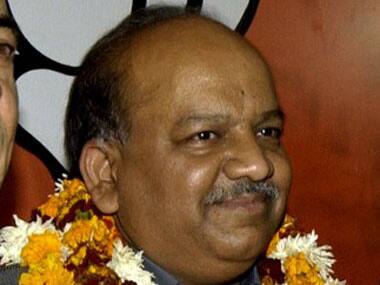Union Health Minister Harsh Vardhan’s controversial mantras of fidelity over condoms and yoga over sex education seem to reflect a worrying disconnect with India’s sexual realities. Going by the growth in condom distribution figures provided by National AIDS Control Organisation (NACO), Harsh Vardhan might be hard pressed to find takers for his policies of fidelity and abstinence. [caption id=“attachment_1604721” align=“alignleft” width=“380”]
 Dr Harsh Vardhan in a file photo. AFP[/caption] “If you look at the overall condom market, it has grown. From 185.2 crore in 2007-08 to 300.8 crore in 2011-12. And of this 300 crore (which includes free condoms distributed by the government), paid condoms account for 76 percent. The paid condom market, on an average, if we take the compounded annual growth rate, has grown by about 15 per cent per cent,” said Gaurav Jain, who leads the Technical Support Group on Condom Promotion at NACO, quoting Nielsen data. The overall condom distribution in India, Jain says, grew by 62 percent between 2007-08 and 2011-12. The figures contradict a widely circulated report published by a leading national daily in October last year that reported a 38 percent drop in condom use in India between 2006-07 and 2010-11. The report was based on a comparison of number of free condoms distributed by the Ministry of Health between 2006-07 and 2010-11. Rubbishing the report, Jain said, “If people are not using free condoms that does not imply they are not using condoms. A drop in free condom usage is compensated by people’s migration from free to paid. Our focus should be that overall usage goes up and that is what is happening.” Easier access and changing perception about condom use, says Jain, are factors contributing to rise in condom use in India. Not exactly music to India’s new Health Minister’s ears who has made no secret of his distaste for promotion of condoms and his discomfort with empowering India’s adolescents with information about responsible sexual behaviour. The minister’s statements have, expectedly, been roundly criticised by experts as being irresponsible and out of step with the times. “Young people have a right to sexual information and we as parents, as governments, should not stand between information and young people. Given today’s urban scenario, where there is hardly any social control, how can we make sure that young people will not experiment? You cannot police sexual behaviour. What we can do is empower young people so that they can take the right decision. This is extremely important for adolescent girls because they are most at risk," says Bilal Ahmed, Director, Programmes, Society for Promotion of Youth & Masses.
Dr Harsh Vardhan in a file photo. AFP[/caption] “If you look at the overall condom market, it has grown. From 185.2 crore in 2007-08 to 300.8 crore in 2011-12. And of this 300 crore (which includes free condoms distributed by the government), paid condoms account for 76 percent. The paid condom market, on an average, if we take the compounded annual growth rate, has grown by about 15 per cent per cent,” said Gaurav Jain, who leads the Technical Support Group on Condom Promotion at NACO, quoting Nielsen data. The overall condom distribution in India, Jain says, grew by 62 percent between 2007-08 and 2011-12. The figures contradict a widely circulated report published by a leading national daily in October last year that reported a 38 percent drop in condom use in India between 2006-07 and 2010-11. The report was based on a comparison of number of free condoms distributed by the Ministry of Health between 2006-07 and 2010-11. Rubbishing the report, Jain said, “If people are not using free condoms that does not imply they are not using condoms. A drop in free condom usage is compensated by people’s migration from free to paid. Our focus should be that overall usage goes up and that is what is happening.” Easier access and changing perception about condom use, says Jain, are factors contributing to rise in condom use in India. Not exactly music to India’s new Health Minister’s ears who has made no secret of his distaste for promotion of condoms and his discomfort with empowering India’s adolescents with information about responsible sexual behaviour. The minister’s statements have, expectedly, been roundly criticised by experts as being irresponsible and out of step with the times. “Young people have a right to sexual information and we as parents, as governments, should not stand between information and young people. Given today’s urban scenario, where there is hardly any social control, how can we make sure that young people will not experiment? You cannot police sexual behaviour. What we can do is empower young people so that they can take the right decision. This is extremely important for adolescent girls because they are most at risk," says Bilal Ahmed, Director, Programmes, Society for Promotion of Youth & Masses.
Reality check, Dr Harsh Vardhan: Condom use booming in India, says NACO
Pallavi Polanki
• July 5, 2014, 20:15:46 IST
Going by the growth in condom distribution figures provided by National AIDS Control Organisation (NACO), Harsh Vardhan might be hard pressed to find takers for his policies of fidelity and abstinence.
Advertisement
)
End of Article